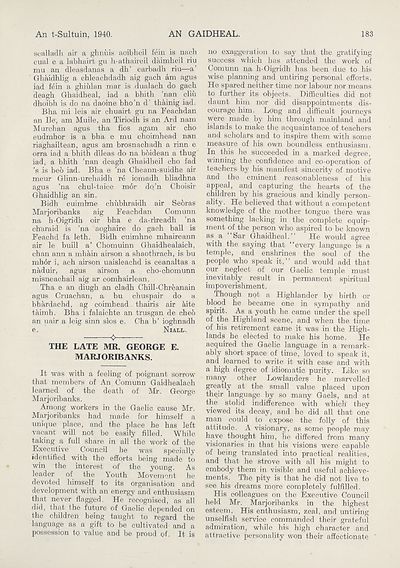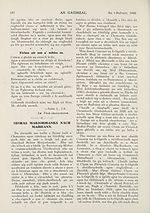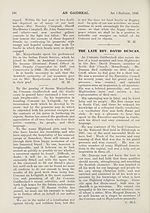An Comunn Gàidhealach Publications > Gaidheal > Volume 35, October 1939--September 1940
(191) Page 183
Download files
Complete book:
Individual page:
Thumbnail gallery: Grid view | List view

An t-Sultuin, 1940.
AN GAIDHEAL.
183
sealladh air a ghniiis aoibheil fein is nach
cual e a labhairt gu h-athaireil daimheil riu
mu an dleasdanas a dh’ earbadh riu—a’
Ghaidhlig a chleachdadh aig gach dm agus
iad fein a ghiiilan mar is dualach do gach
deagh Ghaidheal, iad a bhith ’nan cliii
dhoibh is do na daoine bho’n d’ thainig iad.
Bha mi leis air chuairt gu na Feachdan
an He, am Muile, an Tiriodh is an Ard nam
Murchan agus tha fios agam air cho
eudmhor is a bha e mu choimhead nan
riaghailtean, agus am brosnachadh a rinn e
orra iad a bhith. dlleas do na boidean a thug
iad, a bhith ’nan deagh Ghaidheil cho fad
’s is beo iad. Bha e ’na Cheann-suidhe air
meur Glinn-urchaidh rd iomadh bliadhna
agus ’na chul-taice mor do’n Choisir
Ghaidhlig an sin.
Bidh cuimhne chubhraidh air Sebras
Marjoribanks aig Feachdan Comunn
na h-Oigridh oir bha e da-rlreadh ’na
charaid is ’na aoghaire do gach ball is
Feachd fa leth. Bidh cuimhne mhaireann
air le buill a’ Chomuinn Ghaidhealaich,
chan ann a mhkin airson a shaothrach, is bu
mh6r i, ach airson uaisleachd is ceanaltas a
naduir, agus airson a cho-chomunn
misneachail aig ar comhairlean.
Tha e an diugh an cladh Chill-Chrfeanain
agus Cruachan, a bu chuspair do a
bhhrdachd, ag coimhead thairis air kite
tkimh. Bha i falaichte an trusgan de cheb
an pair a leig sinn slos e. Cha b’ ioghnadh
e. Niall.
THE LATE MR. GEORGE E.
MARJORIBANKS.
It was with a feeling of poignant sorrow
that members of An Comunn Gaidhealach
learned of the death of Mr. George
Marjoribanks.
Among workers in the Gaelic cause Mr.
Marjoribanks had made for himself a
unique place, and the place he has left
vacant will not be easily filled. While
taking a full share in all the work of the
Executive Council he was specially
identified with the efforts being made to
win the interest of the young. As
leader of the Youth Movement he
devoted himself to its organisation and
development with an energy and enthusiasm
that never flagged. He recognised, as all
did, that the future of Gaelic depended on
the children being taught to regard the
language as a gift to be cultivated and a
possession tq value and be proud of. It is
no exaggeration to say that the gratifying
success which has attended the work of
Comunn na h-Oigridh has been due to his
wise planning and untiring personal efforts.
He spared neither time nor labour nor means
to further its objects. Difficulties did not
daunt him nor did disappointments dis¬
courage him. Long and difficult journeys
were made by him through mainland and
islands to make the acquaintance of teachers
and scholars and to inspire them with some
measure of his own boundless enthusiasm.
In this he succeeded in a marked degree,
winning the confidence and co-operation of
teaehers by his manifest sincerity of motive
and the eminent reasonableness of his
appeal, and capturing the hearts of the
children by his gracious and kindly person¬
ality. He believed that without a competent
knowledge of the mother tongue there was
something lacking in the complete equip¬
ment of the person who aspired to be known
as a “Sar Ghaidheal.” He would agree
with the saying that ‘‘every language is a
temple, and enshrines the soul of the
people who speak it,” and would add that
our neglect of our Gaelic temple must
inevitably result in permanent spiritual
impoverishment.
Though npt a Highlander by birth or
blood he became one in sympathy and
spirit. As a youth he came under the spell
of the Highland scene, and when the time
of his retirement came it was in the High¬
lands he elected to make his home. He
acquired the Gaelic language in a remark¬
ably short space of time, loved to speak it,
and learned to write it with ease and with
a high degree of idiomatic purity. Like so
many other Lqwlanders he marvelled
greatly at the small valpe placed upon
thqir language by so many Gaels, and at
the stolid indifference with which they
viewed its decay, and he did all that one
man could to expose the folly of this
attitude. A visionary, as some people may
have thought him, he differed from many
visionaries in that his visions were capable
of being translated into practical realities,
and that he strove with all his might to
embody them in visible and useful achieve¬
ments. The pity is that he did not live to
see his dreams more completely fulfilled.
His colleagues on the Executive Council
held Mr. Marjoribanks in the highest
esteem. His enthusiasm, zeal, and untiring
unselfish service commanded their grateful
admiration, while his high character and
attractive personality won their affectionate
AN GAIDHEAL.
183
sealladh air a ghniiis aoibheil fein is nach
cual e a labhairt gu h-athaireil daimheil riu
mu an dleasdanas a dh’ earbadh riu—a’
Ghaidhlig a chleachdadh aig gach dm agus
iad fein a ghiiilan mar is dualach do gach
deagh Ghaidheal, iad a bhith ’nan cliii
dhoibh is do na daoine bho’n d’ thainig iad.
Bha mi leis air chuairt gu na Feachdan
an He, am Muile, an Tiriodh is an Ard nam
Murchan agus tha fios agam air cho
eudmhor is a bha e mu choimhead nan
riaghailtean, agus am brosnachadh a rinn e
orra iad a bhith. dlleas do na boidean a thug
iad, a bhith ’nan deagh Ghaidheil cho fad
’s is beo iad. Bha e ’na Cheann-suidhe air
meur Glinn-urchaidh rd iomadh bliadhna
agus ’na chul-taice mor do’n Choisir
Ghaidhlig an sin.
Bidh cuimhne chubhraidh air Sebras
Marjoribanks aig Feachdan Comunn
na h-Oigridh oir bha e da-rlreadh ’na
charaid is ’na aoghaire do gach ball is
Feachd fa leth. Bidh cuimhne mhaireann
air le buill a’ Chomuinn Ghaidhealaich,
chan ann a mhkin airson a shaothrach, is bu
mh6r i, ach airson uaisleachd is ceanaltas a
naduir, agus airson a cho-chomunn
misneachail aig ar comhairlean.
Tha e an diugh an cladh Chill-Chrfeanain
agus Cruachan, a bu chuspair do a
bhhrdachd, ag coimhead thairis air kite
tkimh. Bha i falaichte an trusgan de cheb
an pair a leig sinn slos e. Cha b’ ioghnadh
e. Niall.
THE LATE MR. GEORGE E.
MARJORIBANKS.
It was with a feeling of poignant sorrow
that members of An Comunn Gaidhealach
learned of the death of Mr. George
Marjoribanks.
Among workers in the Gaelic cause Mr.
Marjoribanks had made for himself a
unique place, and the place he has left
vacant will not be easily filled. While
taking a full share in all the work of the
Executive Council he was specially
identified with the efforts being made to
win the interest of the young. As
leader of the Youth Movement he
devoted himself to its organisation and
development with an energy and enthusiasm
that never flagged. He recognised, as all
did, that the future of Gaelic depended on
the children being taught to regard the
language as a gift to be cultivated and a
possession tq value and be proud of. It is
no exaggeration to say that the gratifying
success which has attended the work of
Comunn na h-Oigridh has been due to his
wise planning and untiring personal efforts.
He spared neither time nor labour nor means
to further its objects. Difficulties did not
daunt him nor did disappointments dis¬
courage him. Long and difficult journeys
were made by him through mainland and
islands to make the acquaintance of teachers
and scholars and to inspire them with some
measure of his own boundless enthusiasm.
In this he succeeded in a marked degree,
winning the confidence and co-operation of
teaehers by his manifest sincerity of motive
and the eminent reasonableness of his
appeal, and capturing the hearts of the
children by his gracious and kindly person¬
ality. He believed that without a competent
knowledge of the mother tongue there was
something lacking in the complete equip¬
ment of the person who aspired to be known
as a “Sar Ghaidheal.” He would agree
with the saying that ‘‘every language is a
temple, and enshrines the soul of the
people who speak it,” and would add that
our neglect of our Gaelic temple must
inevitably result in permanent spiritual
impoverishment.
Though npt a Highlander by birth or
blood he became one in sympathy and
spirit. As a youth he came under the spell
of the Highland scene, and when the time
of his retirement came it was in the High¬
lands he elected to make his home. He
acquired the Gaelic language in a remark¬
ably short space of time, loved to speak it,
and learned to write it with ease and with
a high degree of idiomatic purity. Like so
many other Lqwlanders he marvelled
greatly at the small valpe placed upon
thqir language by so many Gaels, and at
the stolid indifference with which they
viewed its decay, and he did all that one
man could to expose the folly of this
attitude. A visionary, as some people may
have thought him, he differed from many
visionaries in that his visions were capable
of being translated into practical realities,
and that he strove with all his might to
embody them in visible and useful achieve¬
ments. The pity is that he did not live to
see his dreams more completely fulfilled.
His colleagues on the Executive Council
held Mr. Marjoribanks in the highest
esteem. His enthusiasm, zeal, and untiring
unselfish service commanded their grateful
admiration, while his high character and
attractive personality won their affectionate
Set display mode to:
![]() Universal Viewer |
Universal Viewer | ![]() Mirador |
Large image | Transcription
Mirador |
Large image | Transcription
| An Comunn Gàidhealach > An Comunn Gàidhealach Publications > Gaidheal > Volume 35, October 1939--September 1940 > (191) Page 183 |
|---|
| Permanent URL | https://digital.nls.uk/125145476 |
|---|
| Description | This contains items published by An Comunn, which are not specifically Mòd-related. It includes journals, annual reports and corporate documents, policy statements, educational resources and published plays and literature. It is arranged alphabetically by title. |
|---|
| Description | A collection of over 400 items published by An Comunn Gàidhealach, the organisation which promotes Gaelic language and culture and organises the Royal National Mòd. Dating from 1891 up to the present day, the collection includes journals and newspapers, annual reports, educational materials, national Mòd programmes, published Mòd literature and music. |
|---|---|
| Additional NLS resources: |
|

